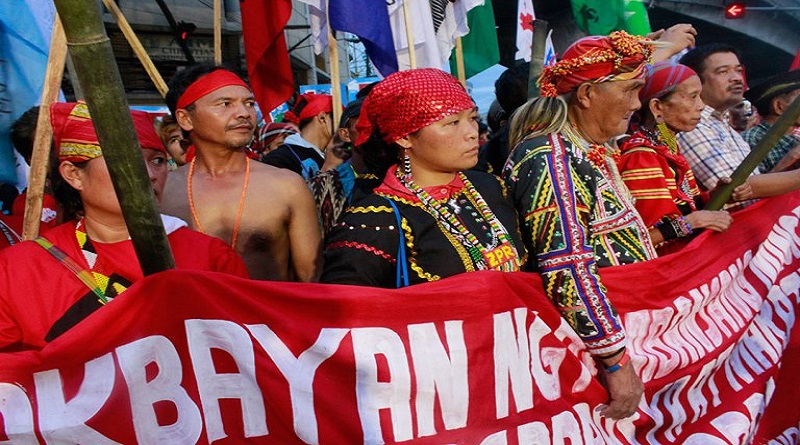National minorities turn to GRP-NDFP human rights monitoring body over US Embassy dispersal
“We hope that our complaint filed before the GRP-NDFP JMC would raise the continuing state-sponsored violence against our people and ancestral lands as a flashpoint concern in the pursuit for a peace based on justice.” — Piya Malayao
MANILA – In an effort to exhaust all means to achieve justice, Sandugo, an alliance of national minorities, asked the Joint Monitoring Committee (JMC) of the Government of the Republic of the Philippines (GRP) and the National Democratic Front of the Philippines (NDFP) to investigate the Oct. 19 violent dispersal at the United States Embassy.
Leaders of Sandugo submitted today complaints against the Manila police before the JMC, which is tasked to monitor the compliance of both parties to the Comprehensive Agreement on Respect for Human Rights and International Humanitarian Law (CARHRIHL).
Human rights alliance Karapatan documented 28 national minorities and supporters who sustained injuries when some 200 elements of the Manila Police District dispersed the protest action calling for an independent foreign policy in front of the US Embassy, Oct. 19. Four were seriously injured as police officer Franklin Kho repeatedly ran over the protesters. Twenty-three others were arrested, including two Lumad minors.
Piya Argee Malayao, convener of Sandugo and secretary general of Katribu said in a statement, “We hope that our complaint filed before the GRP-NDFP JMC would raise the continuing state-sponsored violence against our people and ancestral lands as a flashpoint concern in the pursuit for a peace based on justice.”
Malayao, who was among those who sustained injuries, said they hope the Duterte administration’s peace panel would immediately look into their complaint.
With the resumption of formal peace talks between the GRP and the NDFP, both parties upheld all previous agreements, including the CARHRIHL.
The first substantive agreement between the GRP and the NDFP, CARHRIHL upholds the principles and standards embodied in international instruments of human rights. These include the International Covenant on Civil and Political Rights (ICCPR) which upholds, among others, the right to free speech and assembly, to seek redress of grievances and the right to freedom of thought and expression, freedom of political beliefs. Article 3 of the CARHRIHL includes the right not to be punished or held accountable in the exercise of these civil and political rights.
The JMC has also been reactivated after the second round of formal peace talks between the two parties held earlier this month in Oslo, Norway.
Jerome Succor Aba, Moro leader and co-convener of Sandugo, said their complaint also “serves as a collective expression of support for Duterte’s pronouncements of an independent foreign policy that will cut military and economic subservience to the United States.”
Aba said the JMC could look into what he called as “long history of US-instigated repression and militarization against national minorities.”
“Military and police attacks have been used to stifle resistance and protest against US interests in untapped oil reserves, fertile agricultural lands, and the vast mineral wealth beneath Moro and indigenous people’s territories,” Aba said.
Source: bulatlat.com

